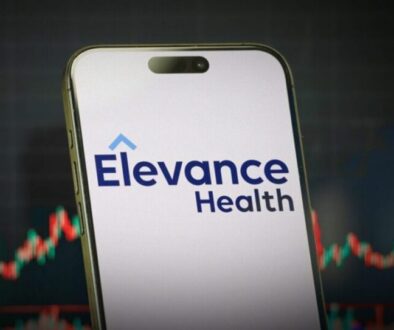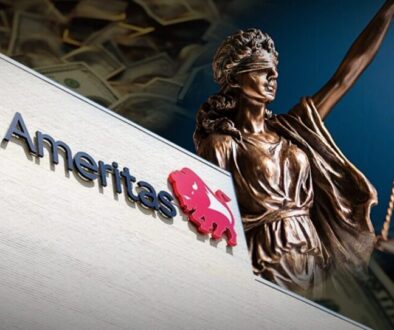Apollo Global reports record Q3 earnings, riding high interest rates
Investment management giant Apollo Global Management on Tuesday reported record earnings for the third quarter, a major beneficiary of rising interest rates and fees.
Adjusted earnings per share rose 23%, from $1.42 per share in the year-ago period to $1.71 per share, on revenue of $2.6 billion. Investment income rose to $3.17 billion, from $2.03 billion in the third quarter of 2022.
Apollo is a unique private equity and management operation with an asset-heavy insurance subsidiary, Athene. The two business sides complement each other as high fee-earning entities and benefit greatly from higher interest rates.
Business ‘better with higher rates’
“Almost everything in our business works better with higher rates,” said Apollo co-founder and CEO Mark Rowan in a call with investors shortly after the quarterly results were released. “Credit, as you know, is a much bigger part of our business mix than most of our peer group…and we are focused on senior secured top of the capital structure. This is a big difference between what people normally think of as private credit, but we want a business that has duration, one that is set up for a difficult economy, notwithstanding all the positives happening in the credit market.”
Fee-related earnings of $472 million rose from $442 million in the second quarter, and $365 million in the third quarter of 2022. Spread-related earnings of $873 million were up from $642 million in the year-ago quarter.
“We’re seeing widening spreads,” Rowan said. “But we are reluctant to budget increased spreads above what Athene has done historically. But if we continue to see the scale of the banking in the investment grade segment of the market, I think we will continue to put up spreads. But that’s not how we budget. And that’s not how we telegraph where we think we’re going. We think the prudent thing is to budget the way we have historically and let the performance speak for itself.”
‘Dry powder’ totals $59 billion
So-called “dry powder,” what the private equity industry calls its stockpile of investment capital that can be deployed for transactions, totaled $59 billion at the end of the third quarter, up from $56 billion at the end of the second quarter.
“There’s lots of dry powder in the equity business, in private markets, but many people are sitting on the sidelines, they have no idea how much of their existing capital is going to need to be used to solve problems in their existing portfolio to get refinancings done,” Rowan said. “Being disciplined over the past decade has left us with a very small number of situations that will require fixing, and therefore we have been on offense. “
Rowan said he expects another $30 billion of inflows for Q4, bringing total inflows for the year to $150 billion.
“The momentum we see in the business tells me we will are on track for continued good performance heading into Q4,” he said. “Obviously the quarter is not done yet, but everything we see tells us the momentum will continue in global wealth.”
Fundamentally, Rowan said, everything in Apollo’s business is working and set up to benefit from the current market.
Wall Street took notice of the company’s rosy scenario and pushed Apollo stock up nearly 8% in midday trading Tuesday, to $83.52 per share. The stock is up almost 51% for the year.
Apollo lauded by analyst
“I see Apollo as one of the best value alternative asset managers,” wrote Seeking Alpha analyst David Ksir, who put a “buy” rating on the stock to hit $90 per share ahead of this week’s earnings results.
Apollo was originally Apollo Advisors when it was founded after the collapse of Drexel Burnham Lambert in 1990 by Leon Black, the former head of Drexel’s mergers and acquisitions department, along with Josh Harris and Rowan. Within six months after the collapse of Drexel, the Apollo launched Apollo Investment Fund L.P., the first of its private-equity investment funds, formed to make investments in distressed companies. Apollo raised about $400 million of investor commitments based on Leon Black’s reputation as a prominent lieutenant of Michael Milken and a major figure in the buyout craze of the 1980s. There was little to no financing for leveraged buyout at the time of its founding and Apollo began a strategy of distressed to control takeovers.
Since then, the company has built a strong reputation for investments in top line companies like ADT Inc., Barnes & Noble, Cox Media Group, Sirius Satellite Radio and Yahoo.
“If you like something now in the equity business, given all the geopolitical implications, given the concerns over recession, given the high-rate environment, given what is generally very difficult financing conditions, you really like it on the margin deployment into the equity business,” Rowan told investors. “I think, for all of ‘23 will prove for our industry to be very, very attractive.”
Doug Bailey is a journalist and freelance writer who lives outside of Boston. He can be reached at doug.bailey@innfeedback.com.
© Entire contents copyright 2023 by InsuranceNewsNet.com Inc. All rights reserved. No part of this article may be reprinted without the expressed written consent from InsuranceNewsNet.com.
The post Apollo Global reports record Q3 earnings, riding high interest rates appeared first on Insurance News | InsuranceNewsNet.



